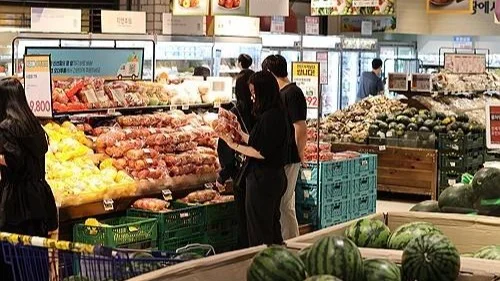S. Korea's economy shrinks 0.2 pct in Q1 amid political chaos, U.S. tariffs
The South Korean economy contracted 0.2 percent in the first quarter of this year, unchanged from an earlier estimate, central bank data showed Thursday, due mainly to a domestic political crisis and uncertainties stemming from U.S. President Donald Trump's administration's aggressive tariff scheme, Yonhap reports.

The country's real gross domestic product (GDP) -- a key measure of economic growth -- contracted 0.2 percent in the January-March period from three months earlier, which marked the first negative growth in nine months, according to the preliminary data from the Bank of Korea (BOK).
The South Korean economy had expanded 1.3 percent in the first quarter of 2024 but slipped into contraction in the second quarter with a 0.2 percent decline before posting 0.1 percent growth in both the third and fourth quarters.
Exports declined 0.6 percent from three months earlier in the first quarter due mainly to slower shipments of chemicals, machinery and equipment.
Facility investment fell 0.4 percent on-quarter, marking its weakest performance since the first quarter of 2024.
Construction investment plunged 3.1 percent and private spending fell 0.1 percent in the first quarter due largely to weakening demand for services.
The unexpected negative growth came as former President Yoon Suk Yeol's imposition of martial law on Dec. 3 and the subsequent political chaos dampened domestic demand.
The U.S.' sweeping tariff scheme has also affected the trade-dependent South Korean economy.
Trump announced reciprocal tariffs, including a 25 percent levy on South Korean goods, though implementation was later postponed for 90 days. Trade negotiations are currently under way between South Korea and the United States, with the two sides aiming to reach a "package" agreement on trade and related issues by July 8, when the 90-day suspension of U.S. tariffs will end.
Last week, the central bank sharply lowered its outlook for South Korea's economic growth this year to 0.8 percent from its previous forecast of 1.5 percent, citing sagging consumption and slowing export growth amid uncertainties stemming from Washington's tariff measures.
The BOK also announced the revised data on the country's gross national income (GNI) for 2024.
The per capita GNI advanced 1.5 percent from a year earlier to US$36,745 last year.
In terms of the Korean won, the GNI climbed 6.1 percent to an all-time high of 50.12 million won. Earlier, the central bank forecast that the per capita GNI went up 1.2 percent to $36,624.
"Based on data from April and May, there were signs that domestic demand was gradually improving," BOK official Kang Chang-goo said at a press briefing.
In April, goods consumption, retail production and facility investment improved compared to the first quarter, though the construction sector and the food and accommodation industries remained sluggish, he added.
"Exports increased on average through May this year, but the impact of U.S. tariff measures is expected to become more pronounced," Kang said.
As reported previously, President of Kazakhstan Kassym-Jomart Tokayev extended his congratulations to Lee Jae-myung on his election as the President of the Republic of Korea.
